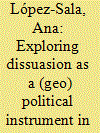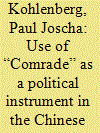| Srl | Item |
| 1 |
ID:
140885


|
|
|
|
|
| Summary/Abstract |
This article analyses the evolution and implementation of Spanish policy to control irregular immigration via maritime routes over the past two decades. Starting from the premise that this policy was based on a comprehensive strategy of dissuasion to prevent, contain and hinder the arrival and settlement of irregular immigrants, for analytical purposes the article introduces the concepts of preventive dissuasion, coercive dissuasion and repressive dissuasion to describe actions of diverse categories, hierarchy and scope that sequentially and simultaneously shape and structure the logic behind dissuasion used in different “territorial settings”. Spain has deployed a great deal of this policy – mainly preventive and coercive dissuasion strategies – through bilateral agreements and formal practices with African countries. This article is based on fieldwork carried out between 2008 and 2012 in different Spanish border areas, including interviews with different actors and visits to border posts and surveillance installations.
|
|
|
|
|
|
|
|
|
|
|
|
|
|
|
|
| 2 |
ID:
151716


|
|
|
|
|
| Summary/Abstract |
The mandate that Chinese Communist Party (CCP) members should “address each other as comrades, not by official rank” (hu cheng tongzhi, bu yao jiao guanxian 互称同志, 不要叫官衔) as an expression of equality and shared values has been reemphasized by the Party leadership time and again. This article shows that relations within the Party are also sometimes deliberately fraught with tension, and as a result, the word “comrade” has been used during intra-Party conflicts with the aim of creating status uncertainty among cadre ranks. This strategic use of “comrade” emerges in purges, campaign politics, and anticorruption efforts. It allows the highest leaders to consolidate their power under the linguistic umbrella of solidarity and to inculcate doubt about personal loyalties among Party factions.
|
|
|
|
|
|
|
|
|
|
|
|
|
|
|
|